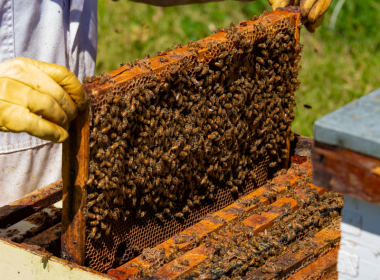News Archives: NBDC Helps Alberta Honey Producer Keep Hives Healthy
Tuesday, January 8th, 2019

In 2008, after years of working in canola production and pollination, Landen Stronks was ready to try something new. “I never anticipated that I would be in the bee industry at all,” he said, “but when the opportunity came along, we decided to go for it.”
Ten years later, Stronks now operates a “blooming” honey and pollination business, Kiwi Brian’s Honey. Located near Lethbridge, Alberta, Kiwi Brian’s is a subset of a leafcutter pollination and seed production operation, Witdouck Farms, and he relies on GPRC’s National Bee Diagnostic Centre (NBDC) to keep his hives healthy.
Starting a new honey production venture was exciting, but daunting. Stronks admitted to feeling “pretty green” at first, and to sometimes needing a helping hand. Occasionally, he had health concern crop up among his hives which he was unsure how to manage.
“In the bee business, the season goes so quickly that you can have a difficult time assessing what went wrong,” he said. “By using the services at NBDC, we were able to send samples in to get some indication of what was going on with our hives.”
NBDC offers a full array of diagnostic testing services for bees.
Stronks relied on NBDC’s testing services recently when a batch of queens he had ordered arrived several days late. Knowing that queen sperm viability can be harmed by longer-than-expected journeys with poor temperature control, Stronks decided to send a few samples in for testing at NBDC. Lab results showed that the queens’ sperm viability was poor, which could have had devastating effects on the survival of the colony had the queens not been replaced.
Stronks used NBDC’s services again one spring when the health of some of his bees went into rapid decline.
“We came across a bee yard where something had gone wrong,” he recalled. “Most of the bees were dying, even though our records indicated they had been healthy going into winter and first visit.”
Results from NBDC’s laboratory showed that the bees had likely ingested a harmful insecticide while collecting pollen in the spring.
“It’s very rare that that happens,” said Stronks, “but you don’t know what the problem is until you test it. The services from NBDC helped us make a decision about what to do next.”
Stronks now routinely uses NBDC testing services to keep an eye on the health of his hives. He has taken advantage of diagnostic tests like Nosema and AFB testing, as well as chemical analysis, virus loads, and queen sperm count and viability. Stronks considers annual health testing to be part of best management practices.
“The services at NBDC help us make better decisions,” said Stronks. “Our hives are stronger and more sustainable.”
Learn more about how NBDC’s services can help hives thrive at gprc.me/nbdc












